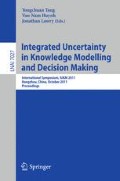Abstract
Emotional Agents can be regarded as traditional ones with emotional factors. There are differences between emotional Agents and traditional Agents in information perception and processing. This paper mainly deals with the design of cognitive module (information processing module) for emotional Agents. The design contains mathematical approaches to human information processing, and also takes account of the achievements in modern Psychology. The cognitive module is easy to be applied in engineering, which makes the design suitable for most circumstances.
Access this chapter
Tax calculation will be finalised at checkout
Purchases are for personal use only
Preview
Unable to display preview. Download preview PDF.
References
Russell, S.J., Norvig, P.: Artificial Intelligence: A Modern Approach, 2nd edn. Prentice Hall, New Jersey (2003)
Minsky, M.: The Society of Mind. Simon & Schuster, New York (1988)
Turkia, M.: A Computational Model of Affects. CoRR, Vol.abs/081 1.0123 (2008)
Barteneva, D., Lau, N., Reis, L.P.: A Computational Study on Emotions and Temperament in Multi-Agent Systems. CoRR, Vol.abs/0809.4784 (2008)
Qiang, J., Lan, P., Looney, C.: A Probabilistic Framework for Modeling and Real-time Monitoring Human Fatigue. IEEE Trans.Systems, Man and Cybernetics, Part A: Systems and Humans 36, 862–875 (2006)
Slater, S., Moreton, R., Buckley, K., Bridges, A.: A Review of Agent Emotion Architectures. Eludamos Journal for Computer Game Culture 2, 203–214 (2008)
Zhuang, J.: The Psychology of Decision-Making. Shanghai Educational Press, Shanghai (2006)
Ortony, A., Clore, G.L., Collins, A.: The Cognitive Structure of Emotions. Cambridge University Press, New York (1988)
MacDorman, K.F., Ishiguro, H.: Generating Natural Motion in an Android by Mapping Human Motion. In: Proceeding IEEE/RSJ Int. Conf. on Intelligent Robots and Systems, pp. 3301–3308. IEEE Press, New York (2005)
Trabelsi, A., Frasson, C.: The Emotional Machine: A Machine Learning Approach to Online Prediction of User’s Emotion and Intensity. In: 2010 10th IEEE International Conference on Advanced Learning Technologies, pp. 613–617. IEEE Press, New York (2010)
Wang, Z.: Artificial Emotion. China Machine Press, Beijing (2007)
Norman, D.A., Ortony, A., Russell, D.M.: Affect and Machine Design: Lessons for the Development of Autonomous Machines. IBM Systems Journal 42(1), 38–44 (2003)
Johnson, E.J., Tversky, A.: Affect, Generalization and the Perception of Risk. Journal of Personality and Social Psychology 45(1), 20–31 (1983)
Eysenck, M.W.: Anxiety: The Cognitive Perspective. Erlbaum, Hove (1992)
Lerner, J.S., Keltner, D.: Beyond Valence: Toward a Model of Emotion-specific Influences on Judgement and Choice. Cognition and Emotion 14, 473–494 (2000)
Author information
Authors and Affiliations
Editor information
Editors and Affiliations
Rights and permissions
Copyright information
© 2011 Springer-Verlag Berlin Heidelberg
About this paper
Cite this paper
Ma, C., Gong, G., Ma, Y. (2011). An Information Processing Model for Emotional Agents Based on the OCC Model and the Mood Congruent Effect. In: Tang, Y., Huynh, VN., Lawry, J. (eds) Integrated Uncertainty in Knowledge Modelling and Decision Making. IUKM 2011. Lecture Notes in Computer Science(), vol 7027. Springer, Berlin, Heidelberg. https://doi.org/10.1007/978-3-642-24918-1_13
Download citation
DOI: https://doi.org/10.1007/978-3-642-24918-1_13
Publisher Name: Springer, Berlin, Heidelberg
Print ISBN: 978-3-642-24917-4
Online ISBN: 978-3-642-24918-1
eBook Packages: Computer ScienceComputer Science (R0)

